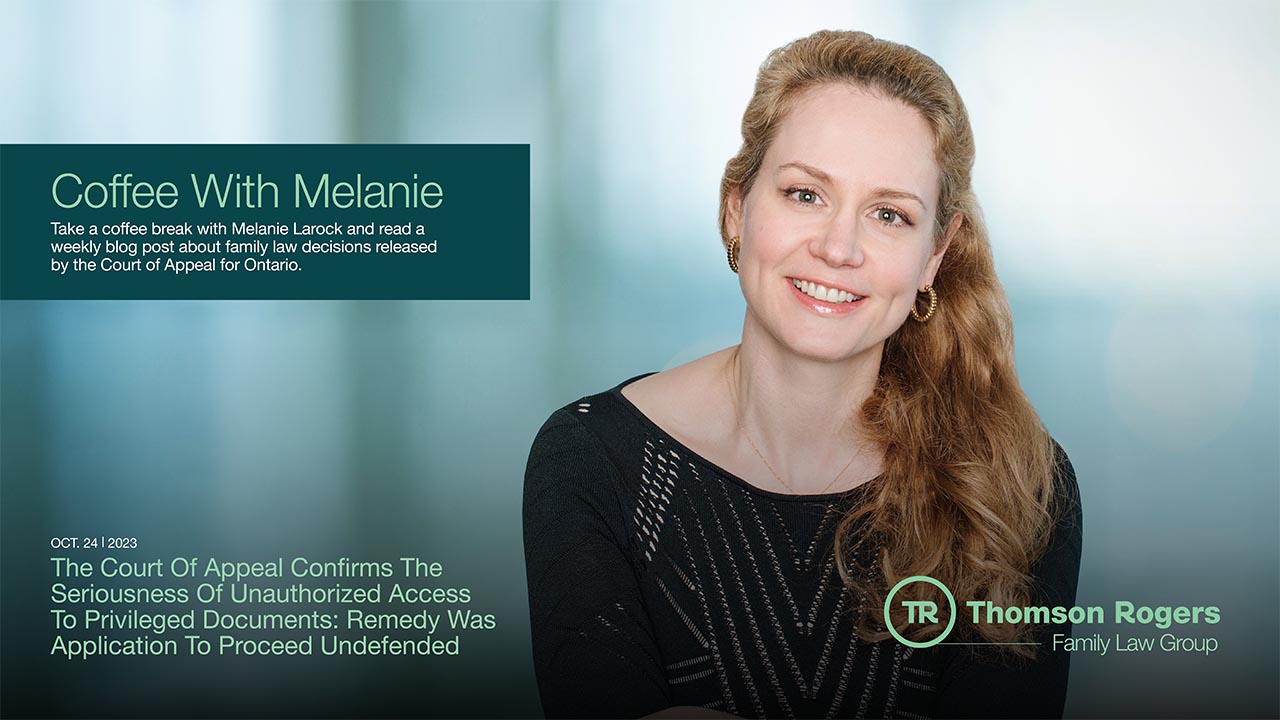The Court Of Appeal Confirms The Seriousness Of Unauthorized Access To Privileged Documents: Remedy Was Application To Proceed Undefended
Author(s): Melanie A. Larock*
October 25, 2023

Take a coffee break with Melanie Larock and read a weekly blog post about family law decisions released by the Court of Appeal for Ontario.
Although not a family law case, the Court of Appeal for Ontario’s decision in 2177546 Ontario Inc. v. 2177545 Ontario Inc. (released October 23, 2023, please click here to see the full decision) impacts all areas of law as it relates to an opposing party accessing solicitor-client and litigation privileged information of the other party.
The Court of Appeal addressed the three-part legal test for determining the appropriate remedy where such privileged information relevant to the litigation was accessed, which can be summarized as follows:
- The moving party must establish that the opposing party obtained access to relevant privileged material.
- There is a presumption of prejudice flowing from the receipt of privileged information. As such, there is a reverse onus, and the responding party bears the onus of rebutting the presumption by identifying that (a) none of the privileged documents were reviewed, (b) only some documents were reviewed which were not privileged, or (c) the privileged documents reviewed were not likely to create prejudice.
- The burden is on the moving party to demonstrate the appropriate remedy to address the prejudice. Non-exhaustive factors in determining the remedy include:
- How the documents came into the possession of the other party or counsel;
- What the other party and counsel did upon recognition that the documents were potentially subject to solicitor-client privilege;
- The extent of the review of the privileged material;
- The contents of privileged material and the degree to which it is prejudicial;
- The stage of the litigation; and
- The potential effectiveness of a firewall or other precautionary steps to avoid mischief.
In this case, the Court of Appeal upheld the application judge’s decision to strike the response to the application and order the application to proceed at an undefended hearing. The Court of Appeal’s reasons included:
- The appellant was found to have “deliberately” accessed privileged emails of the other party. He had read some, downloaded and printed copies of emails that dealt with the other party’s proposed terms of an offer to settle, discussions with counsel as to how to negotiate in the litigation and strategic advice.
- It was not disputed that the appellant had accessed privileged material.
- The appellant had instructed an IT technician to grant him full access to the other party’s email account. Although he did not steal a password or hack into a computer, his conduct was intentional.
- The appellant did not disclose what documents were reviewed and what the appellant did with those documents. The Court was critical of his failure to be forthcoming.
- Lesser remedies of creating a “firewall” between client and lawyer or retaining a new lawyer would not be appropriate because the privileged information was accessed by the client and not the lawyer. Further, appointing a litigation trustee as an alternative remedy would not cure the prejudice as the appellant’s affidavits for the application had already been prepared in the context of the appellant knowing the other party’s litigation strategy.
A party who accesses privileged information relevant to pending litigation and does not disclose that fact will be sanctioned by the Court as such conduct creates a serious risk to the integrity of the administration of justice.
About Melanie Larock
Melanie Larock is a family law litigator and a partner in Thomson Rogers’ Family Law group. Melanie’s focus is on all areas of family law, with a particular emphasis on complex financial issues and high-conflict parenting disputes. Melanie was trained by an illustrious litigator, and she is a self-proclaimed evidence law nerd.
Share this





